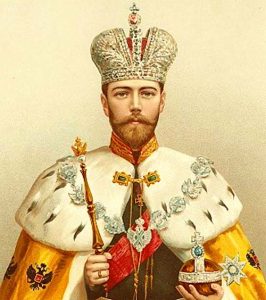(1894 – 1918)

His Imperial Majesty the Emperor Nicholas Alexandrovich, the eldest son of Alexander III, was born on May 6, 1868, entered the throne on October 20, 1894. He was crowned on May 14, 1896.
With him, the beginning of a metal currency circulation in Russia began.
1898 year. At the suggestion of Nicholas II, a note was published on the general limitation of armaments. A program was developed and an international Peace Conference was held in The Hague to discuss the issue of cessation of armaments. Participated in 20 European, 4 Asian and 2 American states. At the suggestion of Nicholas II, a note was published on the general limitation of armaments. A program was developed and an international Peace Conference was held in The Hague to discuss the issue of cessation of armaments. Participated in 20 European, 4 Asian and 2 American states. In the same year, Russia acquired Port Arthur and Talienvan on lease terms from China.
In 1900, a trip to China and the capture of Beijing.
In 1904, the war with Japan as a result of the Russians’ refusal to withdraw their troops after the appointed time and disagreement over Korea.
In 1899, the manifesto on the procedure for drawing up and promulgating laws relating to Finland, and measures aimed at destroying the isolation of Finland.
Nicholas II granted the Russian people broad rights of participation not only in local and public affairs, but also in state ones.
Act of paramount importance is the establishment of the State Duma on the basis of the manifesto on May 17, 1905.
Nicholas II approved the authority of two famous reformers – Vitte and Stolypin. By 1913, Russia’s economy had reached the highest levels: a strong gold ruble, revenues from exports of Vologda oil are higher than from gold exports, Russia is the flagship in grain trade.
Nicholas II completed the Siberian railway, which until our days is the main transport artery of the country.
Nicholas II is married to the Princess of Hesse Alice, who was called by the chrismation of Alexandra Feodorovna. They have four daughters and a son, an heir, the Tsarevich Alexei, who was born on July 30, 1904.
Nicholas II still brought up his adopted son and daughter, the children of his uncle Pavel Alexandrovich, Dmitry and Maria. Their mother died in childbirth, his father quite soon entered into a new marriage, unequal, and two little great princes were eventually raised personally by Nicholas. They called him Dad, the Empress – Mom. He loved Dmitry as his own son. Later, Grand Duke Dmitry Pavlovich, together with Felix Yusupov, would kill Rasputin. For this he will be exiled, will survive during the revolution and will leave for Europe, where he will have an affair with Coco Chanel.
1914 – the beginning of the First World War. On August 1, 1914, Germany declared war on Russia.
In August 1915, Nicholas II took over the military command and spent most of the time at the headquarters of the Supreme Commander in Mogilev.
In late February 1917 in Petrograd began unrest, which turned into mass protests against the government and the dynasty. Upon learning of the uprising in Petrograd, he decided to restore order in the city by force. But, when the scale of the riots was clarified, he abandoned this idea, fearing much bloodshed.
On March 15, 1917, in the saloon car of the imperial train, near Pskov, Nicholas II signed an act of abdication, transferring power to his brother Grand Duke Mikhail Alexandrovich, who did not accept the crown.
On March 20, 1917, the Provisional Government issued an order to arrest the Tsar.
On March 22, 1917, Nicholas II and his family were arrested. The first five months they were guarded in Tsarskoe Selo, in August 1917 they were sent to Tobolsk, where the Romanovs spent eight months.
In early 1918, the Bolsheviks forced Nicholas to remove the shoulder straps of the colonel (his last military rank). He took it as a serious insult. In May this year, the royal family was transported to Ekaterinburg and placed in the house of mining engineer Nikolai Ipatiev.
On the night of July 17, 1918, Nicholas II, the queen, and five of their children: daughters – Olga (1895), Tatiana (1897), Maria (1899) and Anastasia (1901), son – the prince, heir to the throne Alexey (1904) (only 11 people) were shot without trial in a small room on the ground floor of the house. The commander of the Ipatiev House, Yankel Yurovsky, shot himself from the pistol at point-blank range. The bodies of the dead were taken out of the city and buried.
The Last Emperor of Russia.